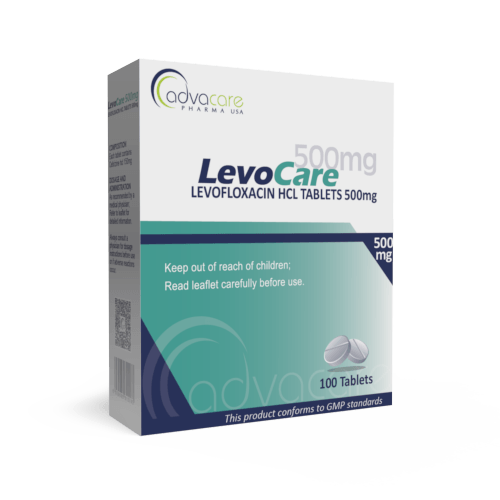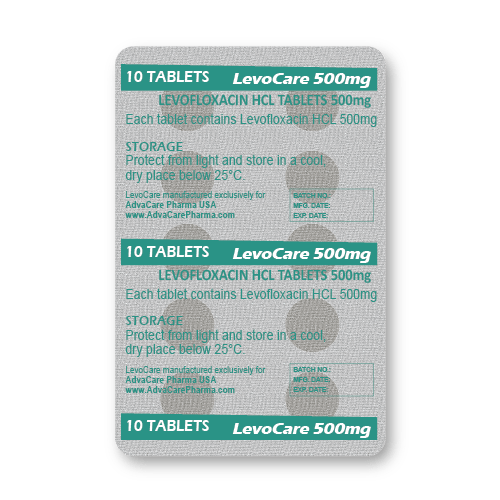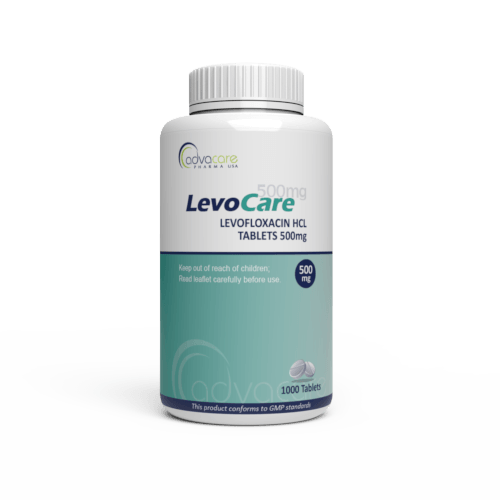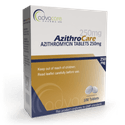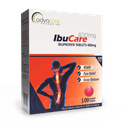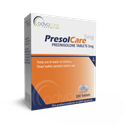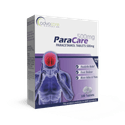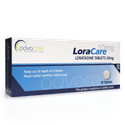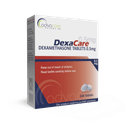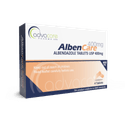- Home›
- Pharmaceuticals›
- Pharmaceutical Tablets›
- Levofloxacin Tablets
Levofloxacin Tablets
Dosage
Packaging
What is Levofloxacin HCl?
Active Ingredients: Levofloxacin HCl
Levofloxacin HCl Tablets are an antibiotic drug used to treat bacterial infections of the throat, ear, mouth, or urinary tract. It may be used to treat bacterial infections that cannot be treated with other antibiotics.
Levofloxacin is also used as a prophylactic treatment in potential anthrax and plague exposures.
Levofloxacin HCl can also be used as eye drops to treat cases of bacterial eye infections.
Levofloxacin is classified as a fluoroquinolone antibiotic that works by blocking bacteria from reproducing. It exerts its antimicrobial activity via the inhibition of bacterial enzymes DNA gyrase and topoisomerase IV. DNA gyrase is only found in bacteria and is essential for chromosome condensation and the initiation of transcription and topoisomerase IV is essential for DNA replication and cell division. Levofloxacin’s inhibition of these enzymes prevents bacterial cell division and results in cell death.
AdvaCare Pharma is a manufacturer and exporter of Levofloxacin Tablets. We offer a wide range of high-quality and cost-effective medications that are available for distribution. Our medications are produced in our GMP-certified facilities in China, India, and the USA.
Why are we a trusted Levofloxacin manufacturer?
We are a Levofloxacin manufacturer engaged in the global distribution of 200+ oral solid pharmaceutical products in tablet dosage form.
As an American-owned and operated company, we are devoted to the manufacture and supply of superior quality, yet cost-effective pharmaceuticals to improve access to healthcare solutions worldwide. AdvaCare Pharma manufactures Levofloxacin Tablets, and over 500 other pharmaceutical treatments, according to strict GMP regulations as part of our global commitment to bring efficacious medicines to pharmaceutical distributors, hospitals, pharmacies and other medical institutions.
Uses
What is Levofloxacin HCl used for?
It is used to treat bacterial infections, such as:
- nosocomial and community-acquired pneumonia
- rhinosinusitis
- some types of urinary tract infections
- some types of bronchitis
- skin infections
- plague
It is also used to prevent plague or anthrax infection after exposures.
How should Levofloxacin HCl Tablets be used?
This medication is intended to be taken orally. Levofloxacin HCl Tablets can be taken with or without food.
Food, beverages, medications, or supplements containing magnesium, aluminum, sucralfate, iron, zinc, or calcium should not be consumed 2 hours before or 6 hours after taking levofloxacin, as they can reduce its efficacy.
Drink fluids liberally for the duration of treatment to combat dehydration and the potential formation of urine crystals.
What dose should be taken and for how long?
The recommended adjustments are as follows:
Adults Dosage may vary based on different medical indications:
- Nosocomial pneumonia: the recommended dose is 750mg once daily for 7-14 days.
- Community acquired pneumonia: based on the organism responsible, the recommended dose is either 500mg once daily for 7-14 days OR 750mg once daily for 5 days.
- Acute bacterial sinusitis: the recommended dose is 500mg once daily for 10-14 days OR 750mg once daily for 5 days.
- Complicated UTI and acute pyelonephritis: based on the organism responsible, the recommended dose is either 250mg once daily for 10 days OR 750mg once daily for 5 days.
- Uncomplicated UTI: the recommended dose is 250mg once daily for 3 days.
- Chronic bacterial prostatitis: the recommended dose is 500mg once daily for 28 days.
- Acute bacterial exacerbation of chronic bronchitis: the recommended dose is 500mg once daily for 7 days.
- Skin and skin structure infections: the recommended dose is 500-750mg once daily for 7-14 days.
- Post-exposure inhalation of anthrax: the recommended dose is 500mg once daily for 60 days. Treatment should be initiated as soon as possible after suspected or confirmed exposure.
- Post-exposure or infection due to Y. pestis: the recommended dose is 500mg once daily for 10-14 days. Treatment should be initiated as soon as possible after suspected or confirmed exposure.
Children (≥ 50kg) Post-exposure inhalation of anthrax: the recommended dose is 500mg once daily for 60 days. Treatment should be initiated as soon as possible after suspected or confirmed exposure.
Post-exposure or infection due to Y. pestis: the recommended dose is 500mg once daily for 10-14 days. Treatment should be initiated as soon as possible after suspected or confirmed exposure.
Children (30 - 49kg) Post-exposure inhalation of anthrax: the recommended dose is 250mg twice daily for 60 days. Treatment should be initiated as soon as possible after suspected or confirmed exposure.
Post-exposure or infection due to Y. pestis: the recommended dose is 250mg twice daily for 10-14 days. Treatment should be initiated as soon as possible after suspected or confirmed exposure.
Levofloxacin’s safety for adult treatments lasting longer than 28 days or pediatric treatments lasting longer than 14 days have not been studied.
The dosage is based on medical condition, response to treatment, age, and weight. Refer to a doctor or pharmacist for guidelines on dosage. Do not exceed what they advise.
What if a dose is missed?
If a dose is missed, it should be taken no later than 6 hours before the next scheduled dose. If it is less than 6 hours before the next dose, skip the missed dose and resume treatment as prescribed. Do not take double doses to compensate for a missed dose.
Who can use Levofloxacin?
Levofloxacin can be administered to adults and children, but caution is advised for specific groups of patients.
Pregnant Animal studies have not revealed evidence of teratogenic effects from levofloxacin doses at about 1-9 times the maximum recommended human dose.
Current human data have not identified a connection between levofloxacin use during pregnancy and major birth defects, miscarriage or adverse maternal or fetal outcomes. While there is no definitive conclusion, the risk cannot be ruled out. The potential clinical benefits and risks should be considered before using levofloxacin during pregnancy.
Nursing Levofloxacin is excreted in human milk. Due to the potential for serious adverse reactions in nursing infants, either nursing or levofloxacin should be discontinued, based on the importance of the drug to the patient. Patients should wait an additional 2 days after levofloxacin discontinuation before resuming nursing. In cases of anthrax exposure, the benefit of nursing while on levofloxacin therapy may warrant the risk.
Pediatric The recommendations for dosage adjustments for children are as follows:
- In pediatric patients < 6 months old, the safety and efficacy of levofloxacin treatment have not been established.
- In pediatric patients ≥ 6 months and older, levofloxacin is indicated for the prophylactic treatment of anthrax and Y. pestis exposure. The safety of levofloxacin treatment lasting longer than 14 days has not been established.
Levofloxacin Tablets are produced at higher doses and should not be administered to pediatric patients who weigh < 30kg. Intravenous (IV) formulations of levofloxacin, such as Levofloxacin Lactate Injection, are recommended for pediatric patients weighing less than 30kg.
Pediatric patients receiving levofloxacin are at an increased risk of developing musculoskeletal disorders, such as arthralgia, arthritis, tendinopathy, and gait abnormalities.
Geriatric Studies with adults ≥ 65 years have not found differences in the safety or efficacy of levofloxacin use in older adults compared to younger adults.
There were no differences in clinical experiences, but a greater sensitivity to medications cannot be ruled out.
Geriatric patients treated with fluoroquinolones, like levofloxacin, have a greater risk for developing severe tendon disorders. This risk is further increased with concomitant corticosteroid therapy.
An increased incidence of aortic aneurysm and dissection up to 2 months following fluoroquinolone use in older patients has been reported.
Other warnings
In patients with renal insufficiency, levofloxacin should be administered with caution and a dosage reduction may be necessary.
In patients with hepatic insufficiency, hepatotoxicity resulting in acute hepatitis and fatalities have been reported. Dosage reductions may be necessary.
Disabling and potentially irreversible serious adverse reactions have been associated with the use of fluoroquinolones, including levofloxacin. Patients should discontinue levofloxacin and contact their doctor immediately if they experience adverse reactions related to the following:
- Tendinitis and Tendon Rupture: Tendinitis or tendon ruptures can involve the Achilles, hand, shoulder, or other tendons and can occur during or up to several months after therapy completion. The risk of adverse tendon effects is elevated in patients who are older, taking corticosteroids, and have had a kidney, heart, or lung transplant.
- Peripheral Neuropathies: Symptom onset may begin early in therapy and may be irreversible. Symptoms related to peripheral neuropathy include pain, burning, tingling, numbness and/or weakness and usually occur in the hands and feet.
- Central Nervous System (CNS) Effects: Patients with a history of convulsions may be at an increased risk for adverse CNS effects and should notify their doctor before taking levofloxacin.
- Prolongation of the QT Interval: Patients with a history of QT prolongation or proarrhythmic conditions (hypokalemia, bradycardia), taking any Class IA (quinidine, procainamide), or Class III (amiodarone, sotalol) antiarrhythmic agents should notify their doctor before initiating treatment.
Fluoroquinolones, including levofloxacin, have also been associated with the onset or exacerbation of myasthenia gravis, photosensitivity/phototoxicity, and diabetes mellitus.
Side Effects
As with all pharmaceutical medicines, some unwanted effects can occur from the use of Levofloxacin HCl Tablets.
Common side effects include, but may not be limited to:
- nausea
- diarrhea or constipation
- dizziness
- headache
- insomnia
Serious side effects may include:
- tendon damage
- peripheral neuropathy
- CNS effects
- myasthenia gravis
- signs of an allergic reaction
- signs of liver damage
- severe diarrhea
- heart problems
For a comprehensive understanding of all potential side effects, consult a medical professional.
If any symptoms persist or worsen, or you notice any other symptoms, please call your doctor immediately.
Precautions
Do NOT use Levofloxacin HCl Tablets if:
- You are allergic to any of the ingredients.
- You are allergic to quinolone antibiotics.
Levofloxacin HCl may not be suitable for people with certain conditions. It is important to consult with a doctor if you have any health conditions, especially if:
- You have a history of diabetes or kidney, nerve, or joint and tendon problems.
- You have a history of seizure disorders and certain muscle problems.
Due to possible drug interactions, consult with your doctor about any medications you are taking before your treatment.
References
Levofloxacin in the treatment of community-acquired pneumonia
Levofloxacin has a broad spectrum of activity against several causative bacterial pathogens of community-acquired pneumonia (CAP). This study evaluated the efficacy and tolerability of levofloxacin 500mg once daily for 10 days in patients with CAP.
A high-dose (750mg), short-course (5 days) of once-daily levofloxacin has been approved for use in the USA in the treatment of CAP. It can also be used for treating acute bacterial sinusitis, acute pyelonephritis, and complicated urinary tract infections.
The conclusion of this study is that levofloxacin is rapidly absorbed and is bioequivalent to the intravenous formulation. This drug is well tolerated and has good tissue penetration and adequate concentrations.

You might be interested in...
Why AdvaCare Pharma?
As an industry leader, we are aware of our responsibility to provide affordable and sustainable solutions to improve healthcare worldwide.
